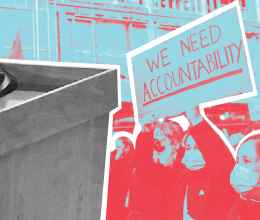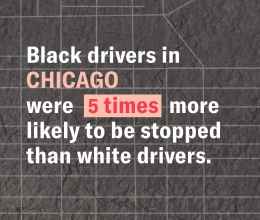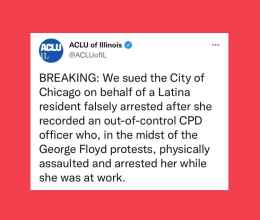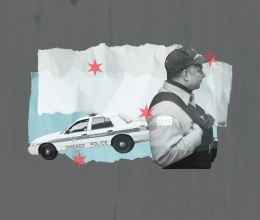
Black and Latino drivers across Illinois continue to be stopped by police at disproportionate rates nearly two decades after Illinois adopted a law to track traffic stops in the state. According to data released recently by the Illinois Department of Transportation (IDOT), Black drivers in Illinois were 1.7 times more likely to be stopped by police than white drivers in 2022. Latino drivers are significantly more likely to be stopped than white drivers in many jurisdictions.
The number of traffic stops reported statewide in 2022 increased by more than 20% from the prior year: from 1,655,935 stops in 2021 to 2,012,182 stops in 2022—an additional 1,000 stops per day across the state. These numbers undercount total traffic stops because roughly 19% of law enforcement agencies failed to report their stops to IDOT as required by law.
“Over the past two decades, this data has consistently demonstrated that Black and Latino drivers are far more likely to be stopped and searched by police compared to their white counterparts,” said Joshua Levin, staff attorney for the ACLU of Illinois.
The data is collected and released pursuant to the Illinois Traffic and Pedestrian Stop Statistical Study Act, first passed by the Illinois legislature in 2003 under the sponsorship of then-State Senator Barack Obama. The Act requires all police departments in Illinois to record and report data about the traffic stops they conduct, including the race of the driver, the reason for the stop, and the outcome of the stop. The Act was aimed at gathering data that police leaders and policymakers across Illinois could utilize in order to identify and address racial profiling by police. But the data for 2022 released by IDOT shows that the pattern of severe racial disparities in traffic stops persists.
In Chicago, for example, Black drivers were nearly four times (3.84) more likely to be stopped than white drivers, while Latino drivers were more than two times (2.31) more likely to be stopped. Black drivers comprised 57% of Chicago police traffic stops, even though they comprise only 36% of the estimated driving population. The Chicago Police Department’s (CPD) data also shows that about 70% of CPD’s traffic stops of Black and Latino drivers were for low-level equipment and registration violations, not dangerous moving violations.
CPD’s mass traffic stop program recently was challenged in a discrimination lawsuit filed by five Black and Latino Chicago residents. The lawsuit alleges that CPD officers are more likely to pull over Black and Latino drivers than white drivers, and that this disparity cannot be justified either by public or traffic safety. The complaint alleges that the racial and ethnic disparities in CPD’s traffic stops are due to CPD policies requiring officers to satisfy traffic stop quotas and flood predominantly Black and Latino neighborhoods on the South and West Sides of the City with traffic stops for alleged minor equipment and registration violations, as confirmed by statistical evidence and public statements from CPD and City officials.
As reflected by the experiences of the five Chicago residents, the complaint alleges that, through its mass traffic stop program, CPD harasses, racially profiles, and demeans hundreds of thousands of law-abiding community members of color who are simply trying to go about their day; in doing so, it undermines public confidence in CPD and wastes public resources, which in turn undermines public safety.
“The recently released CPD data confirms the lawsuit’s central allegation: CPD’s racially discriminatory traffic stops do not advance public safety. Out of all Black and Latino drivers stopped by CPD in 2022, just 0.5% resulted in the recovery of any contraband. In addition, year after year CPD’s data shows that police were more likely to find contraband in traffic stops of white drivers than drivers of color. In 2022, only 3.4% of all CPD traffic stops of Black and Latino drivers even resulted in a ticket,” added Levin. “Despite being ineffective for fighting crime, CPD’s data shows that, in recent years, CPD has massively increased the number of traffic stops from about 86,000 in 2015 to nearly 512,000 in 2022. Just in the period from 2021 to 2022, CPD’s stops of Black drivers increased by more than 22%.”
IDOT data also shows that other communities in Illinois have severe racial disparities in their traffic stop practices. In Aurora, police reported that they were 6.2 times more likely to pull over Black drivers than white drivers, and 3.8 times more likely to stop Latino drivers than white drivers. For nearby Naperville, Black drivers were 3.2 times more likely to be stopped by police, and Latino drivers were stopped at a rate 1.3 times that of white drivers.
Black drivers in Springfield were 5 times more likely to be stopped than white drivers.
In Peoria, Black drivers were 6 times more likely to be stopped, and Latino motorists were 1.7 times more likely. For Bloomington, also located in Central Illinois, Black drivers were 4 times more likely to be stopped, and Latino drivers were 1.7 times more likely.
“This data – collected by the police departments themselves – makes clear what people of color in Illinois have experienced throughout their lives: police consistently single out Black and Latino drivers for more police scrutiny, interference, and intimidation than white drivers. And all too often, minor traffic stops lead to tragic violence at the hands of police,” added Levin. “We call on police departments across the state to use this data as the Illinois legislature intended it: as a tool to eliminate racial profiling. Local officials must answer to the demands of Black and Latino community members calling for an end to racially discriminatory policing. Twenty years after the Illinois legislature began mandating the collection of this data, the time for action throughout the state is long overdue.”



